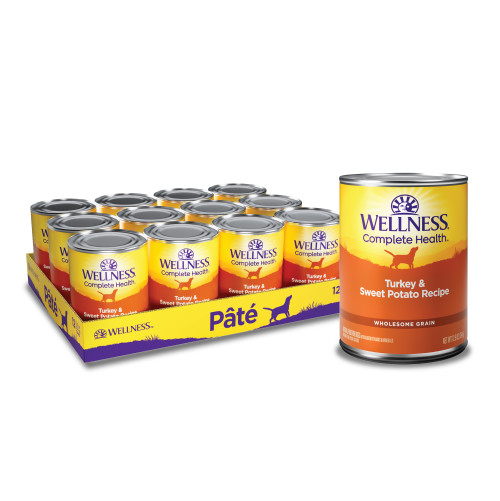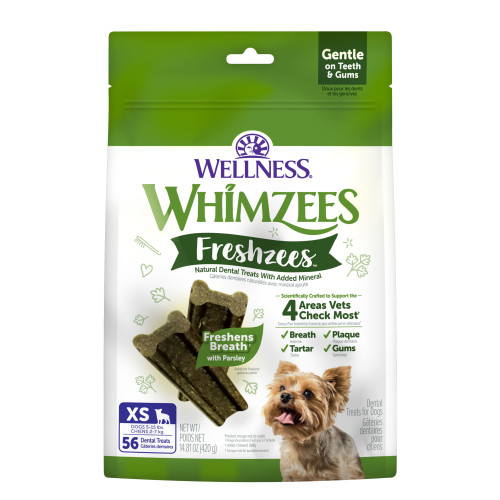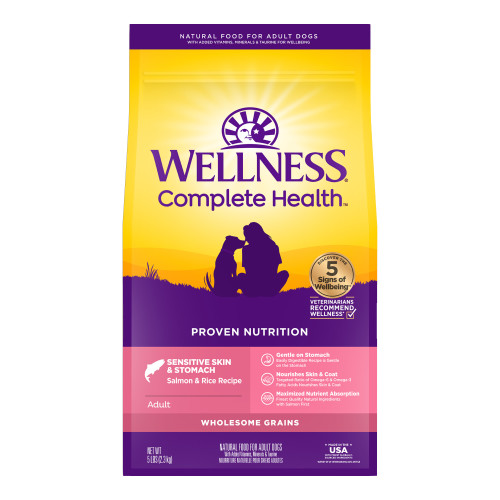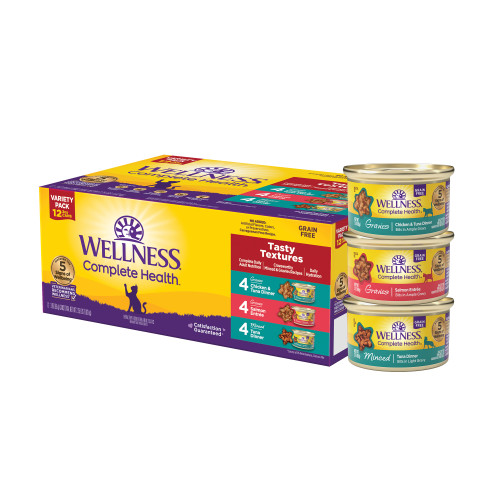August 7, 2024
Multi-Benefit Supplement for a Thriving Pup
August is National Dog Month, a time to shower our furry best friends with extra love and appreciation. But beyond the cuddles and belly rubs, it’s also a perfect opportunity to support their wellbeing and happiness. A healthy pet starts with a high-quality diet like Wellness® that supports the 5 Signs of Wellbeing™. And now you can boost that great nutrition with a daily multi-benefit supplement. This simple daily supplement provides the added supplementation your dog needs to support a healthy body all around. This year, consider incorporating a multi-benefit dog supplement into their routine!
Just like us, dogs have complex nutritional needs. While a balanced diet is essential, a multi-benefit supplement can provide that extra boost to support various aspects of their wellbeing. Here’s how these Wellness® scientifically backed Multi-Benefit supplements can support your dog’s health:
- Supporting Vibrant Skin and Coat: The first thing someone will notice about your dog’s health will be the health of their skin and coat. It is a window into the body that can represent nutritional health, immune health, and hormone balance. Sometimes, despite a high-quality diet and a healthy pet, the coat could still use a smoothing shining boost. This supplement includes zinc, which is needed for a number of enzymes essential in rapidly dividing cells like those of the skin and for converting some fatty acids into usable forms that benefit the skin and coat.1-4 Wellness® Multi-Benefit supplement is also rich in omega-3 (from algae oil and green lipped mussels), and antioxidants (vitamin E and beta-carotene), both known to promote a shiny coat and healthy skin, and can take your dog’s coat to the next level in softness and shine.2,5
- Promoting Healthy Joints and Mobility: This supplement is a powerhouse of joint support ingredients. Green-lipped mussel is a rich source of anti-inflammatory omega-3 fatty acids (especially EPA and DHA), and a natural source of chondroitin sulfate (a component of connective tissue in joints and bones). It also contains joint protective antioxidants like vitamins E and C. Algal oil is another amazing source of EPA and DHA. By themselves, EPA and DHA have already demonstrated effectiveness at alleviating joint pain associated with arthritis in dogs in multiple studies.6-8 Next you will find methylsulfonylmethane (MSM) a compound found in green plants and animals. It has been shown in humans to reduce inflammation and inhibit the breakdown of cartilage in joints and is a powerful antioxidant.9 Rounding out this joint support is Fruite-XB. A vegan mineral complex called calcium fructoborate. It has over 2 decades of research in humans and a study in dogs that show it safe and effective for supporting joints and mobility.10
- Supporting a Healthy Immune System: Colostrum is the first milk made by a mother to feed babies, packed with essential nutrients and important immune-supporting properties that have been shown to influence the immune system of dogs significantly.11 This benefit is also further boosted when colostrum is supplemented with pre-and post-biotics as found in Wellness® Multi-Benefit.12 Next, you will find that zinc also plays a vital role in supporting the immune system, as it is needed in multiple aspects of immunity.13 Most importantly, it is crucial for the normal development and functions of the immune cells. This supplement also contains Bio-Mosâ a mannan-oligosaccharides (MOS) a powerful well studied prebiotic fiber that supports immunity and digestion. 14-16 Wellness® Super Green Blend Essential with chlorella, kale, spinach, astragalus root, and spirulina supply a natural abundance of vitamins and antioxidants that can support your dog’s natural defenses, keeping them healthy and playful.17
- Maintaining/Supporting Digestive Health: Wellness® Multi-Benefit supports healthy digestion with digestive enzymes that support the body’s own digestive enzymes, ensuring the proper breakdown of the nutritious diet so all the nutrients can be properly absorbed. Guaranteed live probiotics supply healthy bacteria to the intestinal tract that help balance the microbiome so that healthy bacteria, and not the pathogenic ones that can make you sick, reign supreme.18 Finally, all those healthy bacteria need a good food source to stay healthy and active this is where prebiotics can aid digestion and promote a healthy gut microbiome.16
- Supporting Healthy Liver Function: The liver is a vital organ that filters the blood, removing toxins, waste, and metabolizes drugs. This organ needs to be in tip-top shape to keep the blood free of toxins that may make animals sick. Milk Thistle Seed Powder has been shown to have antioxidant, anti-inflammatory, and liver-protective effects.19 It has been used since the 16th century in humans, dogs, and cats with acute and chronic liver conditions.20 It is the first supplement reached for when wanting to protect the liver from injury or to help it recover. Choline chloride is critical for healthy liver function. It supports healthy gene expression in the liver that regulates the development of several devastating liver diseases.21 Antioxidants like vitamin A and beta-carotene can help support liver function by easing oxidative stress and preventing liver cell damage.29-30
- Support/Maintain Healthy Brain and Cognitive Function: Docosahexaenoic acid (DHA), a type of omega-3 fatty acid from both algae oil and green-lipped mussel, plays a crucial role in brain development and cognitive function throughout a pet’s lifespan. Studies have shown that DHA is abundant in the neural membranes of animals and essential for proper neuronal signaling and function.22 DHA supplementation in puppies has been linked to improved performance on cognitive tasks related to learning, memory, and problem-solving abilities.23 Similarly, senior dogs fed diets enriched with DHA exhibited better cognitive function compared to those on a control diet.24 In puppies, DHA supplementation during growth has been shown to enhance cognitive function.25 These findings suggest that DHA can be beneficial for pets of all ages, promoting healthy brain development in young animals and potentially helping to slow cognitive decline in senior pets. Antioxidants like vitamin E help protect the aging brain from the accumulated oxidative damage over time, maintaining cognitive function.31-33
- Support/Maintain Performance and Endurance: B-vitamins play a vital role in energy production by aiding the body in converting carbohydrates, fats, and proteins into usable fuel.26 They also contribute to healthy nerve function, crucial for optimal muscle coordination during exercise. B1 (Thiamine) helps convert carbohydrates into energy and supports nervous system function. B2 (Riboflavin) contributes to energy production and helps maintain healthy muscles. B3 (Niacin) plays a role in energy metabolism and helps reduce fatigue. Manganese acts as a co-factor for several enzymes involved in energy metabolism. It also plays a role in collagen synthesis, which is important for maintaining healthy muscles, tendons, and ligaments. Chlorella, a green algae, is a source of various nutrients, including chlorophyll, protein, and antioxidants. While research on its impact on canine and feline athletic performance is ongoing, some studies suggest potential benefits. For example, chlorophyll content might enhance red blood cell production, potentially leading to better oxygen delivery to muscles.27 Chlorella’s antioxidants may help reduce exercise-induced oxidative stress and muscle fatigue.28
Choosing the Right Multi-Benefit Supplement:
With so many options available, selecting the right multi-benefit supplement can feel overwhelming. Here are some tips:
- Supported By Research: Research provides a strong foundation for understanding the effectiveness and safety of a supplement’s ingredients. Look for products with ingredients supported by published studies in reputable scientific journals. Research helps you separate fact from fiction and choose supplements with ingredients that have demonstrably positive effects for your pet’s health. Prioritizing research-backed ingredients demonstrates the manufacturer’s commitment to providing a product with a strong scientific basis. By focusing on research-backed ingredients, you can feel confident you’re providing a supplement that offers genuine health benefits for your beloved companion.
- Look for NASC: While navigating the vast world of pet supplements can be overwhelming, prioritizing those with the National Animal Supplement Council (NASC) seal can offer peace of mind. The NASC is a non-profit organization dedicated to promoting quality standards in the animal supplement industry. The NASC quality seal signifies the supplement has undergone rigorous third-party audits to ensure its ingredients meet label claims and are safe. NASC member companies adhere to strict manufacturing practices, including quality control measures and proper labeling. This transparency builds trust in the product’s safety and effectiveness. While the NASC doesn’t endorse specific ingredients, many NASC- member companies prioritize research-backed ingredients for their products. This focus on scientific evidence helps ensure the supplements offer genuine benefits for your pet. The NASC quality seal signifies the manufacturer’s commitment to quality and safety. Choosing an NASC- member supplement allows you to feel confident you’re providing a product formulated with your pet’s health in mind.
Celebrating National Dog Month with a Multifaceted Approach:
By incorporating a multi-benefit dog supplement alongside a healthy diet and regular exercise, you’re giving your furry friend the foundation for a long, happy, and healthy life. This National Dog Month, show your pup how much you care by going beyond the treats and toys, and invest in their overall wellbeing with a multi-supportive approach!
References
- Watson, Tim DG. “Diet and skin disease in dogs and cats.” The Journal of nutrition 128.12 (1998): S2783-S2789.
- Kaur, Haneet, et al. “Role of omega-3 fatty acids in canine health: a review.” International Journal of Current Microbiology and Applied Sciences 9.3 (2020): 2283-2293.
- White, S. D., et al. “Zinc‐responsive dermatosis in dogs: 41 cases and literature review.” Veterinary dermatology 12.2 (2001): 101-109.
- Marsh, Katrina A., et al. “Effects of zinc and linoleic acid supplementation on the skin and coat quality of dogs receiving a complete and balanced diet.” Veterinary Dermatology 11.4 (2000): 277-284.
- Patel, J. R., et al. “Nutritional approaches for healthy skin and coat in pet dogs.” Indian Farmer 8 (2021): 43-47.
- Bui, Linh M., and Tiffany L. Bierer. “Influence of green lipped mussels (Perna canaliculus) in alleviating signs of arthritis in dogs.” Veterinary Therapeutics 4.4 (2003): 397-407.
- Bierer, Tiffany Linn, and Linh M. Bui. “Improvement of arthritic signs in dogs fed green-lipped mussel (Perna canaliculus).” The Journal of nutrition 132.6 (2002): 1634S-1636S.
- Pollard, B., et al. “Clinical efficacy and tolerance of an extract of green-lipped mussel (Perna canaliculus) in dogs presumptively diagnosed with degenerative joint disease.” New Zealand veterinary journal 54.3 (2006): 114-118.
- Ezaki, Junko, et al. “Assessment of safety and efficacy of methylsulfonylmethane on bone and knee joints in osteoarthritis animal model.” Journal of bone and mineral metabolism 31 (2013): 16-25.
- Price, ANGELA K., et al. “Effects of dietary calcium fructoborate supplementation on joint comfort and flexibility and serum inflammatory markers in dogs with osteoarthritis.” Journal of animal science 95.7 (2017): 2907-2916.
- Satyaraj, Ebenezer, et al. “Supplementation of diets with bovine colostrum influences immune function in dogs.” British Journal of Nutrition 110.12 (2013): 2216-2221.
- Alonge, Salvatore, et al. “Pre-and probiotics to increase the immune power of colostrum in dogs.” Frontiers in Veterinary Science 7 (2020): 570414.
- Shankar, Anuraj H., and Ananda S. Prasad. “Zinc and immune function: the biological basis of altered resistance to infection.” The American journal of clinical nutrition 68.2 (1998): 447S-463S.
- Spring, P., et al. “A review of 733 published trials on Bio-Mos®, a mannan oligosaccharide, and Actigen®, a second generation mannose rich fraction, on farm and companion animals.” Journal of Applied Animal Nutrition 3 (2015): e8.
- Kocher, A. N. D. R. E. A. S., and L. U. C. Y. Tucker. “The’gut health’response to dietary Bio-Mos®: effects on gut microbiology, intestinal morphology and immune response.” (2005): 383-388.
- Perini, Mariana Pamplona, et al. “Potential Effects of Prebiotics on Gastrointestinal and Immunological Modulation in the Feeding of Healthy Dogs: A Review.” Fermentation 9.7 (2023): 693.
- Beynen, Anton C. “Microalgae in petfood.” Creat. Companion 40.7 (2019).
- Sivamaruthi, Bhagavathi Sundaram, Periyanaina Kesika, and Chaiyavat Chaiyasut. “Influence of probiotic supplementation on health status of the dogs: A review.” Applied Sciences 11.23 (2021): 11384.
- Giannetto, Claudia, et al. “Antioxidant and hepatoprotective effect of a nutritional supplement with silymarin phytosome, choline chloride, l-cystine, artichoke, and vitamin E in dogs.” Antioxidants 11.12 (2022): 2339.
- Au, A. Y., J. M. Hasenwinkel, and C. G. Frondoza. “Silybin inhibits interleukin‐1β‐induced production of pro‐inflammatory mediators in canine hepatocyte cultures.” Journal of veterinary pharmacology and therapeutics 34.2 (2011): 120-129.
- Saeed, Muhammad, et al. “Beneficial impacts of choline in animal and human with special reference to its role against fatty liver syndrome.” (2017): 589-598.
- Williams, R. S., & Innis, S. M. (2011). Dietary docosahexaenoic acid and brain development in animals and humans. The American Journal of Clinical Nutrition, 93(4), 1457S-1466S.
- Lands, B., Hernandez, M., Fallon, S., & Sinclair, A. J. (2003). The effect of elevated dietary n-3 polyunsaturated fatty acids on learning and memory in rats. Behavioural Brain Research, 147(1-2), 23-30.
- Lands, B., & Weiser, H. (2007). Omega-3 PUFA deficiency and risk of dementia and cognitive decline. BMC Geriatrics, 7(1), 1.
- Zicker, Steven C., et al. “Evaluation of cognitive learning, memory, psychomotor, immunologic, and retinal functions in healthy puppies fed foods fortified with docosahexaenoic acid–rich fish oil from 8 to 52 weeks of age.” Journal of the American Veterinary Medical Association 241.5 (2012): 583-594.
- Council, National Research, et al. Nutrient Requirements of Dogs and Cats. National Academies Press, 2006.
- Erickson MH, Kudrna D, Smith TJ, Yuhas Y, Schoenfeld NK, de Guia S, et al. Comparison of chlorella supplementation on simulated altitude training in healthy adults. Int J Sport Nutr Exerc Metab. 2011;21(3):210-7.
- Jin J, Sun W, Xie Z. Effects of Chlorella pyrenoidosa on antioxidant activity in plasma and erythrocytes in exhausted rats. J Food Biochem. 2008;32(2):252-8.
- Rodríguez, Cristina Castillo, Fernando Wittwer Menge, and José Joaquin Cerón. “Oxidative stress in veterinary medicine.” Veterinary Medicine International 2011 (2011).
- González, José A. Morales, et al. “The Protective Effect of Antioxidants in Alcohol Liver Damage.” Liver Regeneration (2012): 99.
- Head, Elizabeth. “Oxidative damage and cognitive dysfunction: antioxidant treatments to promote healthy brain aging.” Neurochemical research 34 (2009): 670-678.
- Head, Elizabeth. “Combining an Antioxidant‐Fortified Diet with Behavioral Enrichment Leads to Cognitive Improvement and Reduced Brain Pathology in Aging Canines: Strategies for Healthy Aging.” Annals of the New York Academy of Sciences 1114.1 (2007): 398-406.
- Head, Elizabeth, and Steven C. Zicker. “Oxidative stress, cognitive dysfunction, and brain aging.” Studies on veterinary medicine (2011): 101-111.





